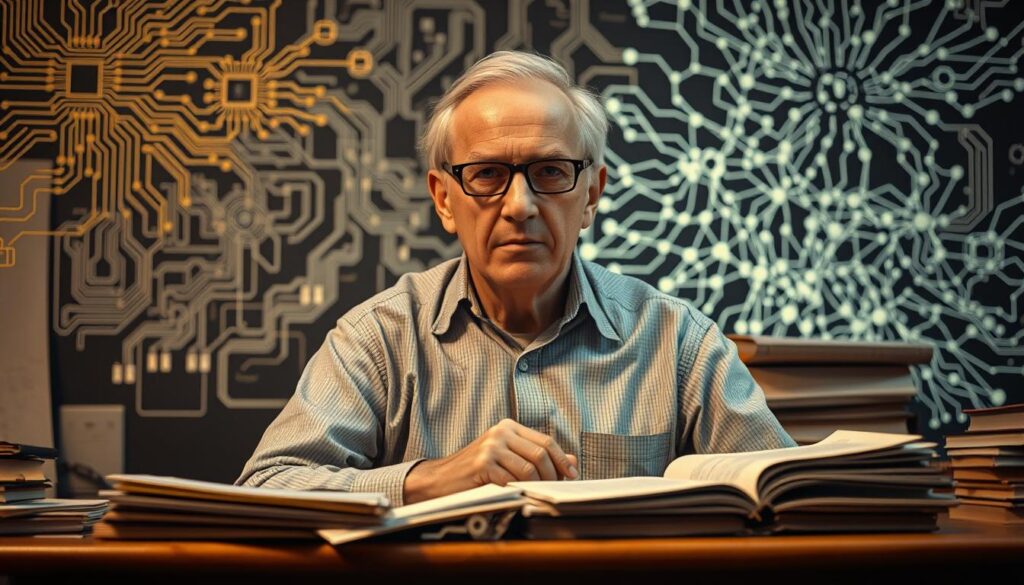Did you know AI started in the mid-20th century? Pioneers wanted to make machines think like humans. Today, AI changes many areas of life, sparking big talks about its future.
John McCarthy and Alan Turing were key in AI’s growth. Their work set the stage for AI’s fast progress. Knowing who started AI helps us see the dreamers behind the machines12.
Key Takeaways
- Artificial Intelligence has roots in mid-20th century innovations.
- Pioneering figures like John McCarthy and Alan Turing significantly impacted AI’s development.
- AI technology has evolved to have broad applications in modern society.
- Understanding the origins of AI provides context for its current advancements.
- Ethical considerations are paramount in discussions surrounding AI’s future.
The Origins of Artificial Intelligence
The story of AI starts with early ideas about computers. In the 1950s, scientists looked into how machines could think like humans. They focused on solving problems and understanding language, laying the foundation for AI.
Alan Turing’s work, “Computing Machinery and Intelligence,” was a turning point. It asked big questions about machine intelligence. His work showed the importance of clear principles for AI’s growth.
This early time was the start of a journey. It aimed to make systems that could think and reason like us3.
Key Figures in AI Development

Artificial Intelligence has been shaped by many influential people. John McCarthy and Alan Turing are two of the most important. Their work has set the stage for AI as we know it today.
John McCarthy: The Father of AI
John McCarthy is known as the father of AI. He introduced the term “Artificial Intelligence” in 1956. He also helped organize the Dartmouth Conference, a key event for AI.
His ideas focused on making machines understand and process human languages. This led to big steps in programming languages and AI algorithms4.
Alan Turing: Pioneering Theoretical Foundations
Alan Turing laid the groundwork for computer science and AI. He came up with the Turing Test, a way to check if a machine acts like a human. His work started important talks about the ethics of machine intelligence5.
Major Milestones in AI History
The history of artificial intelligence is filled with key moments. The Dartmouth Conference in 1956 was a big one. It made AI a real field of study, where experts talked about making machines smart like humans.
This event helped start a wave of new ideas and support for AI. It played a big part in shaping AI’s future.
The Dartmouth Conference: Birth of AI as a Field
The Dartmouth Conference is seen as AI’s starting point. Famous minds shared big ideas, leading to more research in machine learning and other key areas. This meeting brought together experts, creating new ways to fund and support AI research.
Influential AI Discoveries and Technologies
Many AI breakthroughs have changed how we use technology. Advances in machine learning, like neural networks and natural language processing, have made machines smarter. These include things like perceptrons and deep learning, which have opened up new uses in healthcare, finance, and entertainment.
These achievements show how AI has changed our lives. They highlight AI’s role in creating new, influential technologies.
Who created AI?
The field of artificial intelligence has its roots in the hard work of early computer scientists. Marvin Minsky and Herbert Simon were among the pioneers. They developed key theories and technologies that shaped AI’s future.
Their innovative work in automated reasoning and problem-solving systems is still influential today. It shows how their contributions continue to inspire new generations.
The Role of Early Computer Scientists
In the early days of AI, scientists saw the potential of machines to outperform humans in certain tasks. Their discoveries led to essential algorithms and frameworks for intelligent behavior. This work was crucial for AI’s development.
It laid the groundwork for the complex systems we see in modern AI. Their impact is undeniable.
Contributions from Various Disciplines
AI creation is a team effort, drawing from many fields. Mathematics, psychology, and philosophy have all played a part. Mathematical theories helped develop algorithms, while psychology guided the design of machine learning models.
Discussions about consciousness in computer science and philosophy have also been important. They’ve raised ethical concerns and broadened our understanding of intelligence.
Evolution of AI through Decades
The story of AI’s growth is fascinating, filled with ups and downs. In the 1970s and 80s, funding cuts slowed progress, causing a “AI winter.” But, the 1990s brought new life with better data handling and algorithms. The internet and big data then sped up AI’s growth, starting a new era.
In the 21st century, AI made huge strides, thanks to deep learning and neural networks. This made AI more than just a tech wonder. It became a key player in changing industries and our daily lives. People began to see AI’s real value in healthcare, finance, and transport.
AI’s journey shows not just tech growth but also how society views it. As AI evolves, it will face both its benefits and challenges. The past teaches us, preparing AI for its future, balancing tech and ethics4.
FAQ
Who created AI?
What are the origins of AI?
Who is John McCarthy?
What was Alan Turing’s contribution to AI?
What was the significance of the Dartmouth Conference?
What major discoveries have influenced AI?
Who were early computer scientists involved in AI creation?
How do various disciplines contribute to AI development?
How has AI evolved over the decades?
Source Links
- Man who used AI to create child abuse images jailed for 18 years
- Archetype AI’s Newton Model Masters Physics From Raw Data
- Humans are more creative writers than AI models
- How can AI tools optimize phage technology to tackle AMR?
- Meta reportedly developing custom search engine for its Meta AI chatbot – SiliconANGLE







